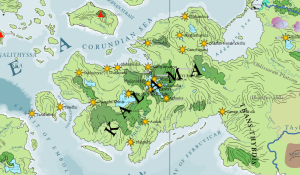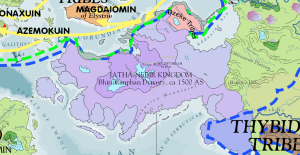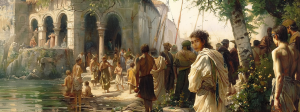Difference between revisions of "Pre-Gwenyan Peoples of Kalama"
Trismegistus (talk | contribs) m |
Trismegistus (talk | contribs) m |
||
| Line 1: | Line 1: | ||
[[File:MapKalamaCityStates.png|thumb|300px|City-States of Ancient Kalaman around 6,100 to 4,400 [[AS]].]] | [[File:MapKalamaCityStates.png|thumb|300px|City-States of Ancient Kalaman around 6,100 to 4,400 [[AS]].]] | ||
| − | Before the first [[Gwenyan]] tribes came to Kalama, there were numerous non-Gwenyan or pre-Gwenyan tribes and cultures in the peninsula. The Rhionian and Vimalian cultures dwell in the central portion of the peninsula. They are descended from the ancient [[Jathya-Dhumi]] peoples. The [[Zalvese People]] of [[Desthor]] and the [[Okiprese Tribe]] of western Kalama are other Jathya-Dhumi peoples who existed in ancient times but have since ceased to be distinct culturally or linguistically. Additionally, the [[Dzeke Tribes]] of northeastern Kalama survived until at least the advent of the Midrinksi. The Dzeke Tribes were not Jathya-Dhumi. Some scholars believe the Dzeke Tribes were related to the pre-Gwenyan [[Tayhoyre River Civilization]]. Some cultural practices and inscriptions from their culture survived to later times. Other non-Jathya-Dhumi and non-Gwenyan peoples that lived to some extent in Kalama were the [[ | + | Before the first [[Gwenyan]] tribes came to Kalama, there were numerous non-Gwenyan or pre-Gwenyan tribes and cultures in the peninsula. The Rhionian and Vimalian cultures dwell in the central portion of the peninsula. They are descended from the ancient [[Jathya-Dhumi]] peoples. The [[Zalvese People]] of [[Desthor]] and the [[Okiprese Tribe]] of western Kalama are other Jathya-Dhumi peoples who existed in ancient times but have since ceased to be distinct culturally or linguistically. Additionally, the [[Dzeke Tribes]] of northeastern Kalama survived until at least the advent of the Midrinksi. The Dzeke Tribes were not Jathya-Dhumi. Some scholars believe the Dzeke Tribes were related to the pre-Gwenyan [[Tayhoyre River Civilization]]. Some cultural practices and inscriptions from their culture survived to later times. Other non-Jathya-Dhumi and non-Gwenyan peoples that lived to some extent in Kalama were the [[Esabdalite]]s who emigrated from the steppes. |
In addition to humans, several indigenous giant tribes, trolls, and elves lived in Kalama before the arrival of humans, but became extinct after the advent of humans. Halflings have lived in Kalama before the Gwenyan tribes and continue to this day in small halfling settlements and enclaves in the larger human cities. | In addition to humans, several indigenous giant tribes, trolls, and elves lived in Kalama before the arrival of humans, but became extinct after the advent of humans. Halflings have lived in Kalama before the Gwenyan tribes and continue to this day in small halfling settlements and enclaves in the larger human cities. | ||
Revision as of 19:49, 6 January 2025

Before the first Gwenyan tribes came to Kalama, there were numerous non-Gwenyan or pre-Gwenyan tribes and cultures in the peninsula. The Rhionian and Vimalian cultures dwell in the central portion of the peninsula. They are descended from the ancient Jathya-Dhumi peoples. The Zalvese People of Desthor and the Okiprese Tribe of western Kalama are other Jathya-Dhumi peoples who existed in ancient times but have since ceased to be distinct culturally or linguistically. Additionally, the Dzeke Tribes of northeastern Kalama survived until at least the advent of the Midrinksi. The Dzeke Tribes were not Jathya-Dhumi. Some scholars believe the Dzeke Tribes were related to the pre-Gwenyan Tayhoyre River Civilization. Some cultural practices and inscriptions from their culture survived to later times. Other non-Jathya-Dhumi and non-Gwenyan peoples that lived to some extent in Kalama were the Esabdalites who emigrated from the steppes.
In addition to humans, several indigenous giant tribes, trolls, and elves lived in Kalama before the arrival of humans, but became extinct after the advent of humans. Halflings have lived in Kalama before the Gwenyan tribes and continue to this day in small halfling settlements and enclaves in the larger human cities.
The first Gwenyan tribes that are known to have visited Kalama are the Pallathantic Tribes, the related Ithatian Tribes, and the Midrinksi.
List of Pre-Gwenyan Peoples of Kalama
- Humanlike, extinct
- Humanlike, present-day
- Humanlike, Immigrant
- Human, Indigenous
- Human, Immigrant
See Also
| This article is a stub. It requires further development by the creator. |

